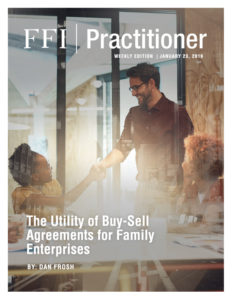
View this edition in our enhanced digital edition format with supporting visual insight and information.
This week’s FFI Practitioner focuses on buy-sell agreements and their role in protecting family enterprise from potential future ownership issues. Thanks to Dan Frosh, this week’s author, for providing an examination of the numerous benefits and features of effective buy-sell agreements within the family enterprise context.
When assisting family business clients in developing succession and estate plans, it is critical that advisers take into account both the needs and capabilities of the business as well as the personal goals and concerns of current and future owners. Due to its flexibility and unique ability to address a diverse set of prospective issues, the “buy-sell agreement” represents a valuable instrument for family business owners and advisers.
A buy-sell agreement is a contract entered into by the owners of a closely-held enterprise to define the various owners’ rights and obligations upon the occurrence of certain “triggering” events. Through the agreement, the parties agree to restrict their right to freely transfer their ownership interest in favor of providing a more orderly transition of the business’ ownership and management. An effective buy-sell agreement should answer the following questions:
- Who has the right to own stock in the company?
- What events will trigger the obligation to buy or to sell?
- What will be the process for valuing the shares?
- What will be the purchase price of the shares and the terms of the transaction?
- How will the transaction be funded?
While many family business clients may already have some form of a buy-sell agreement in place, much like any other business contract, one-size does not fit all or last forever. These families would be wise to review their current agreement periodically to ensure it is up-to-date and still fits their evolving goals. For those family businesses that have not yet included a buy-sell agreement in their planning, here are some reasons why they should consider doing so in the near future:
- To ensure the continuity of family ownership.
For owners who wish to pass the business to the next generation, the agreement can restrict certain lifetime or testamentary transfers of shares to assure the family retains control of the business. - To create a market for the sale of shares.
Inherently, closely-held businesses lack an open market to buy and sell shares, causing the ownership interests to be highly illiquid. An effective buy-sell agreement will create a market as well as the conditions and terms for owners to divest themselves of their shares. - To generate a process for the valuation of the shares.
One of the important functions of a buy-sell agreement is to lay out the process by which the shares will be valued at the time a transaction has been triggered. There are different valuation methods that can be utilized in the agreement, including: a) fixed-price agreements, which set the future purchase price at a specific dollar amount; b) formula agreements, which provide a specific formula for determining the purchase price at the time of the transaction; and c) valuation process agreements, which provide an outline of the valuation process that will take place in the future (e.g., how many appraisers to use, how to select the appraiser(s), and the timing of the appraisal).1 Each of these methods has advantages and disadvantages that you will want to explore with your clients and an attorney before selecting a valuation method. - To establish a funding mechanism to facilitate the transaction.
Ultimately, if at the time of the transaction, the obligated buyer (either the corporation or other shareholders) is unable to pay the purchase price, the buy-sell agreement has failed its primary objective to ensure an orderly transition of ownership. Accordingly, specifying the source of funding for the purchase is among the most critical, yet overlooked sections of a buy-sell agreement. Numerous funding mechanisms exist, which include life insurance policies, an installment sale, liquidating accumulated corporate assets, or borrowing external funds. Determining which option, or combination of options, will best serve your clients’ needs will depend upon their goals and unique financial situations. - To define the conditions that would “trigger” the sale and purchase of shares.
Effective buy-sell agreements will also define a comprehensive set of relevant conditions that, if present, will trigger the transactional obligations of the parties. Like most estate planning issues, these triggering events are not pleasant to consider (e.g., death, disability, and divorce), but your clients will be well-served to evaluate the potential implications of these events now rather than once they have occurred.
Situations Where Buy-Sell Agreements Can Help
Below are some other potential ownership issues that can be alleviated through an effective buy-sell agreement. While this list is by no means exhaustive, it demonstrates the diversity of issues that can be covered by such an instrument and will motivate your clients to review their current buy-sell agreements to ensure they include relevant protections for each of their families.
Estate Planning Issues
- Valuation of Shares for Estate and Gift Tax Purposes
The valuation process outlined in a buy-sell agreement can also serve to establish the value of the deceased owner’s shares for gift and estate tax purposes. In the United States, for example, the IRS tends to examine valuations in transactions between related parties with far greater scrutiny and often turns to the valuation provisions within a buy-sell agreement to determine whether the prescribed value of the decedent’s shares approximate the fair market value.2 Accordingly, family business advisers and lawyers should make sure that their clients are integrating qualified appraisers in the drafting of the buy-sell agreements to avoid potentially catastrophic tax consequences. - Providing Liquidity when Estate Taxes are Due
The family enterprise often represents a highly illiquid asset that could potentially comprise a majority of the owner’s net worth. Consequently, for many owners, paying the associated gift and estate taxes can seem like a crippling prospect. For those owners who have not engaged in adequate tax planning, their fears may be recognized, forcing them to liquidate the business to cover the tax exposure. However, by integrating the drafting of the buy-sell agreement into the owners’ estate planning process, the attorneys can coordinate the use of effective techniques to help minimize the future estate tax burden while simultaneously establishing a funding mechanism to help cover any remaining taxes due.
Personal Issues
- Divorce
All buy-sell agreements should include a provision that enables the other shareholders or the company to purchase the shares from an owner going through a divorce. The absence of such a provision could result in shares being awarded to the non-owner spouse through a property settlement decree, causing some control over the company to rest in the hands of a potentially unfriendly ex-spouse.Especially in community property states, where an ownership interest in a business is likely to be classified as belonging to the marital community, entitling each spouse to an equal stake in the ownership interest, buy-sell agreements can preempt the divorce proceedings and prevent ex-spouses from receiving voting rights on the management of the business. - Bankruptcy/Creditor Protection
What happens if one of the shareholders is embroiled in a bankruptcy proceeding? Can his/her creditors or the bankruptcy trustee end up as an owner of the company? Unfortunately, without a proper buy-sell agreement, they actually could!In order to prevent the business from getting tied up in the personal bankruptcy proceedings of an owner, make sure to include a provision in the agreement that requires the owner to notify his or her fellow owners before filing for bankruptcy. The remaining owners or company will then have the opportunity to purchase the bankrupt owner’s shares at the already-agreed upon price. Ownership and control of the business will remain protected from creditors and the funds received from the purchase should satisfy the bankruptcy trustee’s interest in the company.
Governance Issues
- Captive Minority/Non-Voting Owners
Due to the lack of marketability of closely-held shares, it is possible for shareholders who disagree with the direction of the company to feel trapped in their ownership and nervous about the future value of their interest. In publicly traded companies, the solution is simple – if a shareholder doesn’t agree with the direction of the company, he or she can sell the shares and move on. However, it is not so easy in a closely-held family business where a natural market to sell the shares may not exist.In situations like this, the buy-sell agreement can serve as a dispute resolution instrument, dictating a process that the shareholders must undergo to try to resolve their conflict, with the desired outcome being the redemption of the dissatisfied shareholder’s ownership interest.
A well-drafted buy-sell agreement can go a long way toward ensuring the multi-generational longevity of a family enterprise and can help to protect the family from the negative implications of both foreseeable and unexpected life events. Implementing and periodically updating a buy-sell agreement as appropriate is a wise governance practice for family enterprises and can provide the family-owners with peace of mind about the future of their significant assets.
References
1 Mercer, Christopher. “Buy-sell agreements for Closely Held and Family Business Owners.” Peabody Publishing, 2010. Pages 71-73.
2 “Planning for the Transition of a Real Estate Business: A Primer on Buy-sell agreements” by J. Robert Turnipseed, Esq., and Shelby L. Wilson, Esq. Tax Management Real Estate Journal V. 31, 8, p. 233, 2015.
About the contributor
 Dan Frosh, CFBA, CFWA, is an attorney and advisor at Cambridge Advisors to Family Enterprise. He is a current member of the FFI board of directors and serves as the Managing Editor for FFI Practitioner. Mr. Frosh graduated from Suffolk Law School, where he focused on estate planning and closely-held enterprises. He lives in Los Angeles and can be reached at dfrosh@cfeg.com.
Dan Frosh, CFBA, CFWA, is an attorney and advisor at Cambridge Advisors to Family Enterprise. He is a current member of the FFI board of directors and serves as the Managing Editor for FFI Practitioner. Mr. Frosh graduated from Suffolk Law School, where he focused on estate planning and closely-held enterprises. He lives in Los Angeles and can be reached at dfrosh@cfeg.com.
About Cambridge Advisors to Family Enterprise
Cambridge Advisors to Family Enterprise is a highly specialized international advisory firm serving family enterprises. Cambridge Advisors and Cambridge Institute for Family Enterprise, an education and research institute, are divisions of Cambridge Family Enterprise Group, a global organization founded in 1989 by Professor John Davis. It is devoted to helping families achieve multigenerational success for their families, enterprises, and financial wealth.

View this edition in our enhanced digital edition format with supporting visual insight and information.





